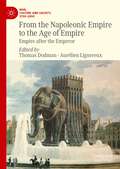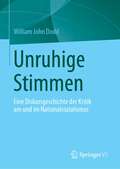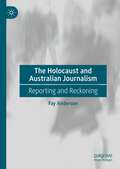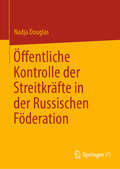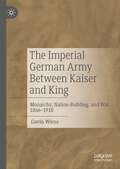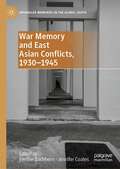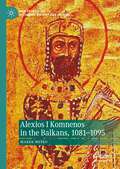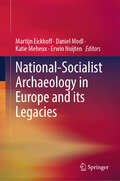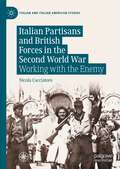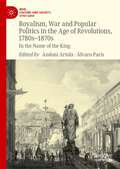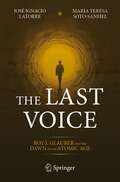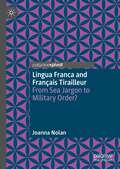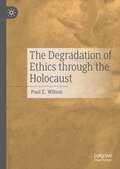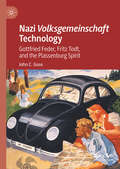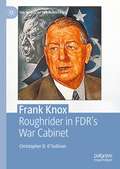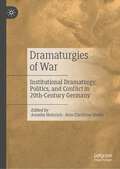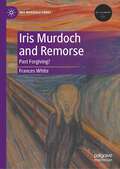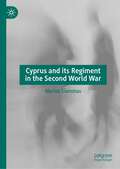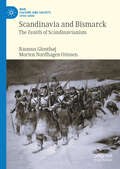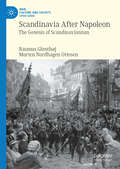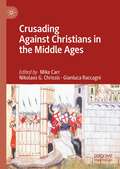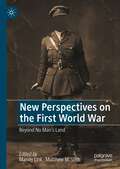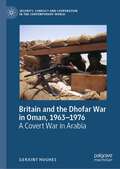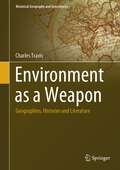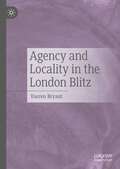- Table View
- List View
From the Napoleonic Empire to the Age of Empire: Empire after the Emperor (War, Culture and Society, 1750–1850)
by Thomas Dodman Aurélien LignereuxThis book explores imperial entanglements to reassess the Napoleonic Empire as a missing link—or at least an important chain—in the global and longue durée history of Empires. In recent years Napoleonic studies have, belatedly but resolutely, embraced the transnational historiographical turn, vastly expanding the field’s geographical scope. Its canonical chronological boundaries, on the other hand, appear increasingly narrow against this wider backdrop, giving the impression of a parenthetical, almost anachronistic aside from 1799 to 1815. What connects, and what doesn’t connect, the Napoleonic Empire to the Age of Empire, remains by and large an open question. Put another way, this book attempts to locate the Napoleonic empire in World History.
Unruhige Stimmen: Eine Diskursgeschichte der Kritik am und im Nationalsozialismus
by William John DoddIn dieser Diskursgeschichte analysiert W. J. Dodd die "unruhigen Stimmen" von Gegnern, deren zeitgenössische Kritik am Nationalsozialismus sich aus Positionen des territorialen und inneren Exils auf die "Sprache des Nationalsozialismus" konzentrierte. Die einzelnen Kapitel befassen sich mit den "Vorläufer"-Diskursen, dem öffentlichen Diskurs der Nazis von 1933 bis 1945, den Zeugnissen der "unruhigen Stimmen" im Ausland sowie in privaten und veröffentlichten Texten im "Reich", den Versuchen zur "Entnazifizierung der Sprache" (1945-49) und den Hinterlassenschaften der Nazi-Vergangenheit in einem retrospektiven Diskurs der "Aufarbeitung" der Nazi-Vergangenheit. In der Zeit nach 1945 konzentriert sich das Buch auf die Anfechtung der "befleckten Sprache" und die Instrumentalisierung der NS-Vergangenheit sowie auf das Fortbestehen sprachlicher Tabus im zeitgenössischen deutschen Sprachgebrauch. Das Buch, das durchgehend in englischer Übersetzung vorliegt, ist eine unschätzbare Quelle für Wissenschaftler der Diskursanalyse, der Soziolinguistik und der deutschen Geschichte und Kultur sowie für Leser mit einem allgemeinen Interesse an Sprache und Politik.
The Holocaust and Australian Journalism: Reporting and Reckoning
by Fay AndersonThis book explores the Australian press reporting of the persecution and genocide of European Jews, and the extent to which the news of the Holocaust was known and believed, revealed and hidden, and acknowledged and minimised. Spanning the coverage of Hitler’s political ascent in the 1920s through to the Nazis’ extermination campaign, it culminates in the accounts of the trials of Nazi war criminals and the post-war transnational migration to Australia of Holocaust survivors, to a country far from universally welcoming in its reception of them. The book also tells the story of the journalists who reported on these tragic events and the editors who published them, along with the political, social and cultural context in which they worked, in an environment influenced by exclusionary ideas about race and nationality that did not necessarily inspire sympathy for Jews and their trauma. This book sheds light on the ethics of reporting human suffering, violence and genocide and – centrally – on the role of the press in shaping Australia’s collective memory of the Holocaust. It encourages readers to think critically about media power, public apathy, advocacy, and the importance of truth. Disturbing evidence of increasing anti-Semitism in Australia as elsewhere, along with continuing Holocaust denial, provide an additional urgency to this study.
Öffentliche Kontrolle der Streitkräfte in der Russischen Föderation
by Nadja DouglasDer Band befasst sich mit den Grundlagen der gegenwärtigen Beziehungen zwischen zivilen Akteuren und staatlichen Machtstrukturen. Der Schwerpunkt liegt auf dem Themenfeld der öffentlichen Kontrolle von Streitkräften und der Frage, warum zivile Akteure ein wachsames Auge auf die militärische Institution sowie zivile Behörden, die den Einsatz von Gewalt legitimieren, haben sollten. Am Beispiel von Wehrpflicht und Rekrutierung als Schnittstelle zwischen Militär und Gesellschaft analysiert die Studie den institutionellen Wandel im politisch-militärischen Bereich im postsowjetischen Russland. In kritischer Auseinandersetzung mit der konventionellen Militärsoziologie verlagert das Buch den Fokus weg von der exklusiven Machtbeziehung zwischen politischen und militärischen Eliten im Kontext der nationalen Sicherheit. Stattdessen berücksichtigt es die menschliche und gesellschaftliche Sicherheit, d.h. die Bedürfnisse und Forderungen von Individuen und Gruppen an der Basis, die vom Militär und der herrschenden Sicherheitslage in Russland betroffen sind. Das Buch richtet sich an Leser mit Interesse an zivil-militärischen Beziehungen, gegenwärtiger russischer Gesellschaftspolitik und Theorien sozialer Bewegungen.
The Imperial German Army Between Kaiser and King: Monarchy, Nation-Building, and War, 1866-1918
by Gavin WiensThis book provides a reappraisal of Germany’s military between the mid-nineteenth century and the end of the First World War. At its core is the following question: how 'German' was the imperial German army? This army, which emerged from the Wars of Unification in 1871, has commonly been seen as the 'school of the nation'. After all – so this argument goes – tens of thousands of young men passed through its ranks each year, with conscripts undergoing an intense program of patriotic education and returning to civilian life as fervent German nationalists and ardent supporters of the German emperor, or Kaiser. This book reexamines this assumption. It does not deny that devotion to the Fatherland and loyalty to the Kaiser were widespread among German soldiers in the decades following unification. It nevertheless shows that the imperial German army was far less homogenous and far more faction-ridden than has hitherto been acknowledged.
War Memory and East Asian Conflicts, 1930–1945 (Entangled Memories in the Global South)
by Eveline Buchheim Jennifer CoatesThis book explores how narratives, exhibitions, media representations, and cultural heritage sites that communicate memories of conflicts in East Asia between 1930 and 1945 spread, interact, and are re-packaged for post-war audiences across national divisions. The contributors examine individual case studies of grassroots engagement with war memory, and collectively demonstrate the necessity of remaining aware of the researcher as participating in another kind of engagement with war memory. Contributions showcase a number of ways of doing research on war memory, alongside case studies from diverse regions of the world. Taken together, they bring a fresh perspective to scholarship on war memory, which has tended to focus on space, text, exhibition, or personal narrative, rather than bringing these elements into dialogue with one another.
Alexios I Komnenos in the Balkans, 1081–1095 (New Approaches to Byzantine History and Culture)
by Marek MeškoThis book provides a new military history of Byzantine emperor Alexios I Komnenos's campaigns in the Balkans, during the first fourteen years of his rule. While the tactics and manoeuvres Alexios used against Robert Guiscard's Normans are relatively well-known, his strategy in dealing with Pecheneg and Cuman adversaries in the region has received less attention in historical scholarship. This book provides a much-need synthesis of these three closely linked campaigns – often treated as discrete events – revealing a surprising coherence in Alexios' response, and explores the position of Byzantium's army and navy on the eve of the First Crusade.
National-Socialist Archaeology in Europe and its Legacies
by Martijn Eickhoff Daniel Modl Katie Meheux Erwin NuijtenThis edited volume is dedicated to national-socialist archaeology as a Europe-wide phenomenon. It analyses national-socialist attempts to denationalize the archaeologies of European nations by creating a new unifying European archaeology on a racial basis.From the beginning of the nineteenth century, archaeology began to develop into an important force behind processes of nation building. At the same time, structures of transnational academic collaboration contributed strongly to the internal dynamics of the research field, which was primarily organized on a national basis.In those European countries that were confronted with national-socialist occupation and repression between 1939 and 1945, these transnational archaeological networks were to prove crucial for the development of national-socialist archaeological policies.This volume will reveal how national-socialist archaeology was to an extent valued positively in its time as highly innovative, even influencing the archaeology of non-occupied countries. Although in the final instance, it generally failed to displace the national archaeologies in Europe, the volume also analyses the long-term impact of national-socialist rule on the development of European archaeology. How did the attempts to create a unified European archaeology after 1945 continue to influence networks, methods and terminologies, institutional structures, or popular representations of the early past?
Italian Partisans and British Forces in the Second World War: Working with the Enemy (Italian and Italian American Studies)
by Nicola CacciatoreThis book proposes a significant new interpretation of the relations between Italian partisans and British forces during the Italian campaign of 1943-1945. The core of the argument challenges many assumptions that are today still present both in Italian and in the Anglophone historiography on the subject. In current historiography, the debate is still ongoing as to whether the British were a hostile force to the Italian Resistance, trying to weaken it to better control it, or a genuine and committed ally. Instead of a clear-cut and artificial dichotomy between the 'Italians' and the 'British' this book posits the idea that lines were often blurred, and relations existed on a scale that included lots of grey and overlapping areas. Thanks to an original approach that examines the Italo-British interaction from a point of view as close as possible to the ‘action’, it proposes a new interpretation based on the way the British image was cast in Italy. Politics is left in the background in favour of an analysis of the concrete problems and difficulties that Italians and the British had to face when working together and how these processes influenced the image of Great Britain in Italy in the following decades. This produces a final interpretation that enriches current historiography and pushes forward our understanding of the relationship between Italian partisans and British forces.
Royalism, War and Popular Politics in the Age of Revolutions, 1780s-1870s: In the Name of the King (War, Culture and Society, 1750–1850)
by Andoni Artola Álvaro ParísThis book offers a ground-breaking approach to royalism and popular politics in Europe and the Americas during the Age of Revolutions. It shows how royalist and counterrevolutionary movements did not propose a mere return to the past, but rather introduced an innovative way of addressing the demands and expectations of various social groups. Ordinary people were involved in the war and adapted the traditional imaginary of the monarchy to craft new models of political participation. This edited collection brings together scholars from France, Spain, Norway, and Mexico, to provide a transatlantic comparative perspective. It is a must-read for scholars and students looking to discover the lesser-known side of the Age of Revolutions, and the motivations of those who fought in the name of the king.
The Last Voice: Roy J. Glauber and the Dawn of the Atomic Age
by José Ignacio Latorre María Teresa Soto-SanfielMost human beings don’t manage to achieve fame. Roy J. Glauber did so for two different reasons. Glauber was not only a Nobel-Prize winning physicist, but also one of the last surviving scientists who worked in Los Alamos in the Theoretical Division of the Manhattan Project. He was a witness to all the events and knew all the scientists associated with the creation and launch of the first atomic bombs. This book is the product of a series of long interviews held with Roy over three years: in Benasque (Spain) in 2011, and later in Singapore and Cambridge (USA). Its pages give a first-hand account of a true protagonist, one who is independent, lucid, sagacious and committed to the truth. The authors have respectfully preserved his spirit: his voice is the one that matters. The authors asked the questions and they relay his answers. Their comments are confined to the footnotes and to brief explanatory paragraphs, added simply to provide certain relevant details. The importance of the events that Glauber describes here is indisputable, as therefore is the book itself. The events narrated in its pages will remain part of world history, perhaps for centuries or even millennia. We live today in the shadow of the decisions made at that time.
Lingua Franca and Français Tirailleur: From Sea Jargon to Military Order?
by Joanna NolanThis book explores how the eponymous and original Lingua Franca was recognized as a potential linguistic template for future military and colonial pidgins. The author traces the career trajectory of General Louis Faidherbe, a member of the French colonizing force in Algiers in the early 1830s and a recognized linguist, who rose up through the ranks in various African colonies and was the founder of regiments in West Africa, including the Senegal-based tirailleurs. Their artificially constructed military pidgin, Français Tirailleur, was a language modelled on the reduced grammar and lexicon of Lingua Franca. This book demonstrates the direct link between the two languages, as well as connections with other colonial pidgins in Asia that also derived to some extent from Lingua Franca. It will be of interest to students and scholars of language contact and language history, pidgins and creoles, and military and colonial history.
The Degradation of Ethics Through the Holocaust
by Paul E. WilsonThis book discusses ethical behavior through the genocidal stages of the Holocaust. Paul E. Wilson first looks at the antisemitism in Germany and Europe beginning in the decades preceding the Nazis reign of terror, and goes on to discuss the ethical decisions made in the initial stages that moved society toward genocide. The author maintains that the stages of genocide represent subtle changes that can be happening within a society in response to the moral choices made by actors. By giving attention to the stages of genocide in the Holocaust, this book contributes to the overall understanding of how the Holocaust was possible, and encourages the moral community to join the watch for the development of genocide in the modern world.
Nazi Volksgemeinschaft Technology: Gottfrried Feder, Fritz Todt, and the Plassenburg Spirit
by John C. GuseThis book traces how Gottfried Feder and Fritz Todt made technology essential to the Nazi ‘world view’. They groomed engineers with a racist technical ideology that prepared them to later supervise slave labor and the Holocaust. Their concepts evolved from völkisch technocracy to an idealized harmony of man, machine and nature, and were eclipsed by Albert Speer’s total war. Partially due to willing ‘self-coordination’ from engineers, they gained political control over the engineering profession. Destined to be pillars of the Volksgemeinschaft, engineers were indoctrinated with Nazi principles of Aryan superiority at the Reich School of Technology, the Plassenburg. Nazi propaganda announced a bright future through technology, furthering a sense of normalcy in Germany, despite the ruthless exclusion of those unwanted.
Frank Knox: Roughrider in FDR’s War Cabinet (The World of the Roosevelts)
by Christopher D. O’SullivanFrank Knox served as Secretary of the Navy during some of the most eventful years in U.S. naval history, his tenure coinciding with a number of dramas such as the innovative 1940 bases-for-destroyers initiative (which he conceptualized prior to entering the administration), the undeclared naval war in the Atlantic against Germany’s U-boats in 1941, the December 1941 attack on Pearl Harbor, the subsequent naval war in the Pacific, and naval landings in North Africa and Italy. Knox’s most important contribution to the war effort was his leadership in building a 1,000-ship fleet, without which the much-heralded landings and battles might never have been possible. In this comprehensive biography, Christopher D. O’Sullivan offers a portrait of the Roughrider in FDR’s cabinet.
Dramaturgies of War: Institutional Dramaturgy, Politics, and Conflict in 20th-Century Germany
by Anselm Heinrich Ann-Christine SimkeThis book examines the institutional contexts of dramaturgical practices in the changing political landscape of 20th century Germany. Through wide-ranging case studies, it discusses the way in which operationalised modes of action, legal frameworks and an established profession have shaped dramaturgical practice and thus links to current debates around the “institutional turn” in theatre and performance studies. German theatre represents a rich and well-chosen field as it is here where the role of the dramaturg was first created and where dramaturgy played a significantly politicised role in the changing political systems of the 20th century. The volume represents an important addition to a growing field of work on dramaturgy by contributing to a historical contextualisation of current practice. In doing so, it understands dramaturgy not only as a process which occurs in rehearsal rooms and writers’ studies, but one that has far wider institutional and political implications.
Iris Murdoch and Remorse: Past Forgiving? (Iris Murdoch Today)
by Frances WhiteThis exploration of the crucially important role played by remorse in Iris Murdoch’s philosophical, theological, and political thinking identifies it as a critical concept in her moral psychology and a recurrent theme in her art. Through engagement with Simone Weil, current theories of remorse, trauma theory and Holocaust studies, it offers fresh perspectives on Murdoch’s fiction – particularly the late novels, her radio play The One Alone, and her monograph Heidegger.
Cyprus and its Regiment in the Second World War
by Marios SiammasThis book explores the role of the Cyprus regiment, a military unit of the British Army, in the Second World War. Highlighting the contribution of Cyprus to the war effort, the book contributes to the limited historiography on the military engagement of Cyprus in the Second World War. Through an analysis of British official records and interviews the author aims to provide the required chronological and contextual placement of events involving Cyprus and the Cyprus Regiment. By drawing upon veterans’ narratives and operational insights, the book offers a personal view and assessment of the Second World War period. The book covers a number of themes, including the recruitment of Cypriots to the British Army and the training they received, the establishment of the Cyprus Volunteer Force, the experiences of Cypriot soldiers while serving in multiple countries, and the wider impact of the war on Cyprus, economically, socially and militarily.
Scandinavia and Bismarck: The Zenith of Scandinavianism (War, Culture and Society, 1750–1850)
by Rasmus Glenthøj Morten Nordhagen OttosenThis book accounts for Scandinavian unification efforts in a time of great upheaval. The ideological repercussions of the European revolutions of 1848-1849 and the Crimean War (1853-1856) transformed both the international political system and nationalism into more ‘realist’ types. The First Schleswig War (1848-1851) having nearly turned into one of Scandinavian unification, the influence of Scandinavianism extended into the Danish, Swedish and Norwegian courts, cabinets and parliaments, attracting interest from the great powers. The Crimean War offered another window of opportunity for Scandinavian unification, before the Danish-German conflict over the duchies of Schleswig and Holstein nearly united Scandinavia upon the outbreak of the Second Schleswig War in 1864. The ultimate failure of Scandinavianism in its unification efforts was not predetermined, although historiography has made it appear as such. Napoleon III, Cavour and Bismarck all actively contributed to plans for Scandinavian unification, the latter even declaring himself as “very strongly Scandinavian”.
Scandinavia After Napoleon: The Genesis of Scandinavianism (War, Culture and Society, 1750–1850)
by Rasmus Glenthøj Morten Nordhagen OttosenThis book explores the intellectual grounds of Scandinavianist ideology and its political development into a national unification movement. Denmark, Norway and Sweden were nearly annihilated during the Napoleonic Wars. The lesson learned was that survival was a matter of size. Whereas their union of 1814 offered Sweden-Norway geostrategic security tempered by fear of Russia, Denmark was the biggest territorial loser of the Napoleonic Wars and faced separatism connected to German nationalism in the duchies of Schleswig and Holstein. This evolved into a national conflict that threatened Denmark’s survival as a nation. Meanwhile, a new generation of Danes, Swedes and Norwegians had come to regard kindred language, culture and religion as a case for Scandinavian union that could offer protection against Russia and Germany. When the European revolutions of 1848 unleashed the First Schleswig War, the influence of Scandinavianism was such that it nearly turned into a Scandinavian war of unification.
Crusading Against Christians in the Middle Ages
by Mike Carr Nikolaos G. Chrissis Gianluca RaccagniThis is the first book-length study into crusading against Christians, examining this complex phenomenon from the twelfth to fifteenth centuries and across numerous regions, from France to Russia and from southern Italy to the Baltic. Whilst the crusades are an immensely popular topic, those launched against Christian rulers and communities have been comparatively overlooked in the past, with existing studies typically focusing on a particular area, period, or campaign. This volume brings together the expertise of thirteen scholars on a variety of primary and secondary sources not often accessible to Anglophone readership, as well as their knowledge of national discourses which have often shaped historiography. It aims to serve as the first port of call for anyone who wishes to approach crusades against Christians within and without the specialism of crusader studies, and to provide the basis for a thorough comparative analysis of this phenomenon, covering its variety as comprehensively as possible.
New Perspectives on the First World War: Beyond No Man’s Land
by Mandy Link Matthew M. StithTaken collectively, the chapters in New Perspectives on the First World War: Beyond No Man’s Land not only illuminate pieces of the Great War that remain in the shadow of the broader narratives, but also, and more importantly, foster new perspectives, pose distinct questions, and suggest fresh directions from which future work might emerge. Transnational approaches, the cultural and environmental history of war, and gender’s ubiquitous but heretofore marginalized role in the larger conflict together merit fresh research and careful new interpretation.
Britain and the Dhofar War in Oman, 1963–1976: A Covert War in Arabia (Security, Conflict and Cooperation in the Contemporary World)
by Geraint HughesThis book explores Britain’s involvement in the Dhofar War of 1963-1976, focusing on the military aspects of this conflict in Southern Oman. It reveals how both the Conservative and Labour governments in office during this time provided military and security assistance to Oman’s rulers without parliamentary or press scrutiny. Based on archival material and witness accounts, as well as existing secondary source literature and memoirs, this study provides new insights into Britain’s clandestine embroilment in the Dhofar War, an often overlooked but historically significant intervention in the Middle East. This book will be a valuable resource for scholars and students interested in the complex and often controversial history of Britain’s involvement in Middle Eastern politics in the post-colonial period.
Environment as a Weapon: Geographies, Histories and Literature (Historical Geography and Geosciences)
by Charles TravisEnvironment as a Weapon considers how the confluence of war and nature from the time of the Agricultural Revolution (10,000 BCE) to our present day has been represented in works of history, geography, and literature. In the Epic of Gilgamesh, the Torah and Greco-Roman myths, warfare is a trope commensurate with environmental disasters, extreme climate, and plague. In the medieval age myths the Táin, and Beowulf environments become allies and enemies. The equestrian steppeland as foundation of Genghis Khan’s and his heirs Pax Mongolica is chronicled in The Secret History of the Mongols and The Travels of Marco Polo. The West African Griot legend of Sundiata and the Little Ice Age wreck of the Spanish Armada in 1588 speak to oceanic and atmospheric dimensions of warfare. American Revolution political pamphlets, poetry, diaries and weather logs, reflect the severe weather and terrain deployed by George Washington’s early campaigns in the war of independence. Napoleon’s midwifing of Total War is captured in Mary Shelley’s Frankenstein, Leo Tolstoy’s War and Peace, and Charles Minard’s Carte figurative carto-graph of the disastrous 1812 French invasion of Russia. The U.S. Civil War and the organic-industrial assembles of its battles, arguably the first Anthropocene War, is parsed by the clarifying poetry of Emily Dickinson. Geopolitik and geo-hazards of flood and fire feature in the Global War works of Samuel Beckett, Kurt Vonnegut and James Dickey. The literature of Vietnamese and American war combat veterans reveals how North Vietnam’s Environmental Military Complex stalled the American Military Industrial Complex in the jungles, and R&R districts of southwestern Asia. Finally, he sci-fi of H.G. Wells’ World Set Free and David Mitchell’s Cloud-Atlas frame Oppenheimer’s sub-atomic deployments at Hiroshima and Nagasaki, James Lovelock’s ‘Gaia’ and U.S. military discourses situating global warming as a national security threat to America. Indeed, Environment and War ironically resonates with U.N. Secretary General António Guterres proclamation that “seventy-five years ago, the world emerged from a series of cataclysmic events: two successive world wars, genocide, a devastating influenza pandemic . . . Our founders gathered in San Francisco promising to save succeeding generations from the scourge of war.” Thus, a holistic approach to studying and mitigating the human and environmental impacts of warfare, must integrate methods from the arts, humanities and sciences. This involves understanding how the historical geographies of the Earth’s planetary systems have been perceived, deployed and emerged as agents of warfare, with the lithosphere, hydrosphere, cryosphere, biosphere and atmosphere transformed as arsenals against anthropogenic global warming. This book will be of interest to geographers, historians, and scholars in environmental studies, climate change, literature and military studies, as well as the broader environmental humanities.
Agency and Locality in the London Blitz
by Darren BryantThis book takes a fresh approach to the London Blitz by viewing this time through individual local boroughs of the metropolis. The term ‘London Blitz’ means that culturally we have become accustomed to understanding that the actual blitz experience was the same wherever in the capital one happened to be, despite some areas being hit more than others. This book illustrates how there were many London blitzes, not one, influenced by a myriad of metropolitan localities, and giving rise to an agency of locality that helped to shape the lived blitz experience. By walking through the streets of London, this book conducts a local area analysis, witnessing the blitz through six London localities, representative of the assorted administrative, economic, and socio-political variables prevalent in wartime London. Covering air raids alongside topics like the provision of shelters, homelessness, and communal feeding, it shows how any history of the London Blitz must acknowledge that it was an experience reflective of a varied metropolis.
